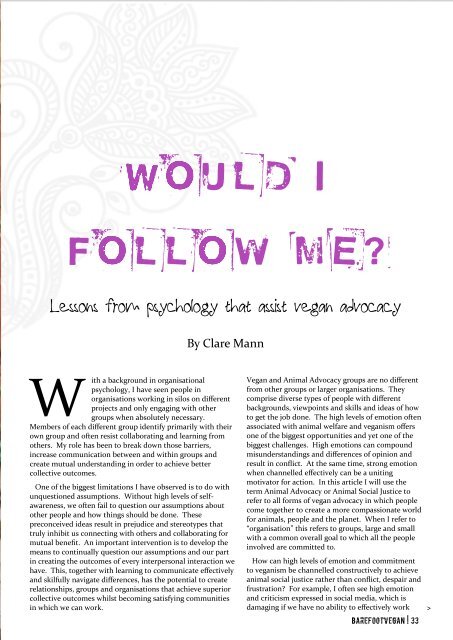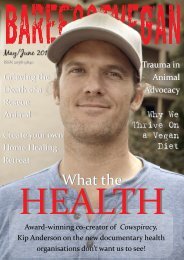Barefoot Vegan Magazine March_April 2017 issue
This issue of Barefoot Vegan Magazine is themed around community. We speak to vegan social justice activist, Brenda Sanders about what motivates her work, her best advice on running effective community outreach programmes and how to avoid burnout. We also feature interviews with London Afro Vegan's Esme, co-founder of Food Not Bombs, Keith McHenry, and we talk about community crowdfunding with One Planet Pizza's Mike Hill. Plus as usual, we've got lots of beautiful and inspiring content from our contributors and a huge selection of delicious vegan recipes.
This issue of Barefoot Vegan Magazine is themed around community. We speak to vegan social justice activist, Brenda Sanders about what motivates her work, her best advice on running effective community outreach programmes and how to avoid burnout.
We also feature interviews with London Afro Vegan's Esme, co-founder of Food Not Bombs, Keith McHenry, and we talk about community crowdfunding with One Planet Pizza's Mike Hill.
Plus as usual, we've got lots of beautiful and inspiring content from our contributors and a huge selection of delicious vegan recipes.
You also want an ePaper? Increase the reach of your titles
YUMPU automatically turns print PDFs into web optimized ePapers that Google loves.
Would I<br />
Follow Me?<br />
Lessons from psychology that assist vegan advocacy<br />
By Clare Mann<br />
W<br />
ith a background in organisational<br />
psychology, I have seen people in<br />
organisations working in silos on different<br />
projects and only engaging with other<br />
groups when absolutely necessary.<br />
Members of each different group identify primarily with their<br />
own group and often resist collaborating and learning from<br />
others. My role has been to break down those barriers,<br />
increase communication between and within groups and<br />
create mutual understanding in order to achieve better<br />
collective outcomes.<br />
One of the biggest limitations I have observed is to do with<br />
unquestioned assumptions. Without high levels of selfawareness,<br />
we often fail to question our assumptions about<br />
other people and how things should be done. These<br />
preconceived ideas result in prejudice and stereotypes that<br />
truly inhibit us connecting with others and collaborating for<br />
mutual benefit. An important intervention is to develop the<br />
means to continually question our assumptions and our part<br />
in creating the outcomes of every interpersonal interaction we<br />
have. This, together with learning to communicate effectively<br />
and skilfully navigate differences, has the potential to create<br />
relationships, groups and organisations that achieve superior<br />
collective outcomes whilst becoming satisfying communities<br />
in which we can work.<br />
<strong>Vegan</strong> and Animal Advocacy groups are no different<br />
from other groups or larger organisations. They<br />
comprise diverse types of people with different<br />
backgrounds, viewpoints and skills and ideas of how<br />
to get the job done. The high levels of emotion often<br />
associated with animal welfare and veganism offers<br />
one of the biggest opportunities and yet one of the<br />
biggest challenges. High emotions can compound<br />
misunderstandings and differences of opinion and<br />
result in conflict. At the same time, strong emotion<br />
when channelled effectively can be a uniting<br />
motivator for action. In this article I will use the<br />
term Animal Advocacy or Animal Social Justice to<br />
refer to all forms of vegan advocacy in which people<br />
come together to create a more compassionate world<br />
for animals, people and the planet. When I refer to<br />
“organisation” this refers to groups, large and small<br />
with a common overall goal to which all the people<br />
involved are committed to.<br />
How can high levels of emotion and commitment<br />
to veganism be channelled constructively to achieve<br />
animal social justice rather than conflict, despair and<br />
frustration? For example, I often see high emotion<br />
and criticism expressed in social media, which is<br />
damaging if we have no ability to effectively work<br />
<strong>Barefoot</strong><strong>Vegan</strong> | 33<br />
>




